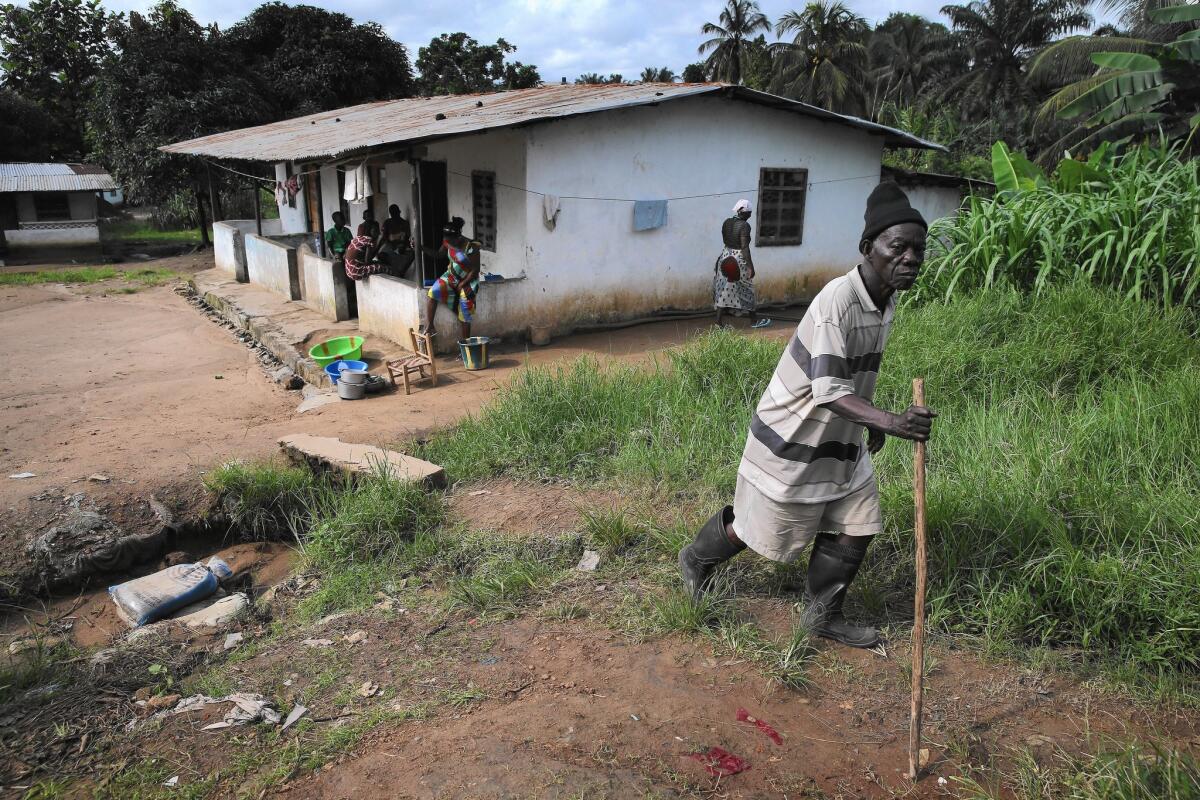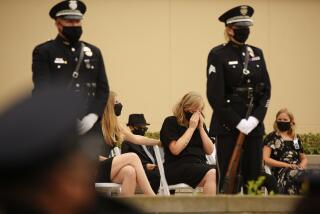Texas Ebola patient aided Liberia woman thought to have malaria

- Share via
Reporting from Paynesville, Lilberia — The Ebola virus that infected Thomas Eric Duncan, the Liberian man who fell ill in Texas, has sickened at least six others in the sandy neighborhood near the Liberian capital where he lived in a rented room with a plain wooden door.
A chain of confusion and denial links the Dallas apartment complex to which he moved to a dark green house about 30 yards from Duncan’s door in Liberia, where the desperate family of a dying pregnant woman treated her illness as malaria, not the highly infectious virus that has killed more than 3,300 people.
Now two members of the Williams family, Duncan’s neighbors and landlords, are dead, three other people are sick and Duncan has become the first person to develop symptoms of the disease in the United States.
If not for the Williams family’s insistence, perhaps based on wishful thinking, that 19-year-old Marthalene Williams didn’t have Ebola, the disease might never have reached U.S. soil.
Duncan, 42, known to his neighbors as Eric, left home about 11 a.m. on Sept. 19 with a backpack and a suitcase, telling his neighbor, Irene Seyou, that he wasn’t coming back for two years.
“He told me he was going to America. He said he was going to live his life and be there for two years, and then he will come home and build his own house,” Seyou said.
Four days earlier, he had tried to help Marthalene Williams on what turned out to be her final full day. Surviving family members and neighbors sketched out the sequence of events:
Duncan had ridden in a taxi with Marthalene, who was seven months pregnant and desperately ill, as they crisscrossed the Liberian capital, Monrovia, going from a clinic to two hospitals, trying to get her admitted. With them were her father, Emmanuel, and brother Sonny Boy.
From the clinic, where she was given an intravenous drip but deteriorated sharply, they were sent to an Ebola treatment unit and then another, at a time when there were no Ebola beds available in the city.
After hours of waiting, evening fell. They gave up and went home to Paynesville, just south of Monrovia.
Duncan helped carry her down a red sandy track, past his front door to her family’s house. Together they placed her on the floor in her living room. She died there in the early hours of the next morning, surrounded by weeping members of her family.
“When she was dying, she was fighting,” said a brother, Mekey, 18, who was in the room with all the family. “I felt so bad.... I knew she was going to die. My mother was crying. Every one of us was crying that night.”
It’s unclear whether the Williamses knowingly misled people, as angry neighbors charge, or whether they were simply convinced that Marthalene didn’t have the virus, like so many other desperate families in Liberia.
Apart from Duncan, those infected included Marthalene’s brother and parents, the neighbor in the closest house and her husband.
Since they shared bathrooms and bedrooms in cramped living quarters, it’s likely that more members of the two families will contract Ebola.
What happened in Paynesville is common in parts of West Africa where Ebola has been spreading. When a loved one becomes ill, family members assume, or hope, that it’s something else. They buy malaria, typhoid and headache medicine from a drugstore, or from a nurse, as Marthalene did. They wash and care for the sick person, moving them and touching them and their clothing, and the infection circle widens a little further.
One reason for the reflexive denial is stigma; another may be people’s terror of the disease.
According to neighbors, people in the community didn’t realize until Wednesday that Marthalene Williams had died of Ebola. That was the day that two other people died — her brother Sonny Boy and her close neighbor Sarah Smith — and news emerged of Duncan’s illness in Texas.
Like Duncan, Robert Garway rents a room from the Williams family, his house one pace away from theirs. When he and his wife, Sarah Smith, heard that the landlord’s daughter was sick, he thought they should pitch in, as Duncan did. They helped move Marthalene and touched her. It was difficult to say no to the landlord.
“We thought it was a fever or some other thing. There were plenty of people who touched her, and I was among them,” Garway said, speaking on his cellphone from an Ebola unit where he is undergoing treatment.
On Thursday morning, the four Williams children — Mekey, 18; Ezo, 16; Tete, 12; and Stanley, 3 — huddled anxiously behind their house, looking downcast and frightened. Stanley, unaware of the crisis facing his family, was smiling and giggling and wanted to play with his sister.
An angry group gathered on a hill above the family’s house, shouting angrily that Amie and Emmanuel Williams must have known that their daughter had Ebola.
One woman screamed that her children had played with the Williams children. Another shouted that one of the Williams women had plaited her hair. Others were furious that they had gone into the Williamses’ house after Marthalene’s death to view her body. Bodies of Ebola victims are even more contagious than living patients.
As a crowd gathered and the shouting grew louder, accusations flew. Some claimed that she had vomited on Duncan. Some said that she had bled from the mouth. Others said the family lied and said she’d been injured in a car accident. Few of the accusations were consistent, other than the general outrage that the family told neighbors she had died of “low blood,” or low blood pressure, and pregnancy complications.
But the Blessing Home Clinic, which examined Marthalene on Sept. 15, had diagnosed malaria, according to staffers. When she started convulsing, they told the family to take her to a hospital.
After she died, Mekey and the other family members prepared her body. She was hunched, so they straightened her, tenderly laid her out and covered her. Several people carried her and placed her in a casket.
“Her parents said she never died of Ebola, so everyone in the community went to sympathize,” said a furious Martu Weeforo, 37, one of the neighbors on the hill. “Plenty of people came in the yard.”
Mekey said his parents left home early Thursday after falling sick a few days ago. He said they had gone to get treatment, but he didn’t know where. Their phones were switched off.
Garway, the neighbor, went to an Ebola treatment unit in the John F. Kennedy Medical Center on Thursday, shocked into action by the deaths of his wife and Sonny Boy. Speaking by phone from the treatment unit, he said he and his wife both started feeling odd nine days ago.
“Everybody started getting sick. Everybody started feeling funny at the same time,” Garway said. “I am happy I’m among the living.”
More to Read
Sign up for Essential California
The most important California stories and recommendations in your inbox every morning.
You may occasionally receive promotional content from the Los Angeles Times.













